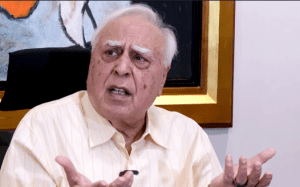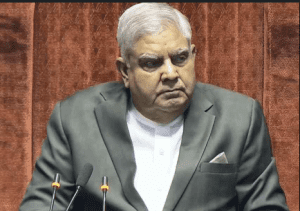New Delhi : Senior Rajya Sabha Member and veteran lawyer Kapil Sibal has ignited a fresh political debate by delivering a pointed and wide-ranging criticism of Vice President Jagdeep Dhankhar. Responding to recent remarks made by Dhankhar regarding the elevation of President Droupadi Murmu under India’s constitutional framework, Sibal invoked historical parallels with the Indira Gandhi era to emphasize that the Indian Constitution has long upheld the values of inclusivity and representation — regardless of which party is in power.
Sibal’s rebuke, however, went far beyond a single statement. In a meticulously argued press conference, he launched a broader critique of Dhankhar’s tenure as Chairman of the Rajya Sabha, accusing him of failing to maintain institutional neutrality, silencing opposition voices, and indulging in public displays of ideological bias. His remarks come at a time when tensions between the ruling BJP and opposition INDIA bloc have reached a crescendo, with parliamentary sessions increasingly marred by walkouts, protests, and allegations of one-sided conduct.
Sibal’s Response to Dhankhar’s President Remark: The Indira Gandhi Comparison
 The immediate trigger for Sibal’s comments was Vice President Jagdeep Dhankhar’s recent rhetorical question: “Could Droupadi Murmu have become the President if the Constitution did not exist?” The remark, perceived by many as a political endorsement of the current regime’s role in promoting marginalized leaders, was sharply rebutted by Sibal.
The immediate trigger for Sibal’s comments was Vice President Jagdeep Dhankhar’s recent rhetorical question: “Could Droupadi Murmu have become the President if the Constitution did not exist?” The remark, perceived by many as a political endorsement of the current regime’s role in promoting marginalized leaders, was sharply rebutted by Sibal.
He reminded the Vice President that it was Indira Gandhi, under the same Constitution, who appointed Giani Zail Singh, a man from humble roots, as India’s President decades ago. Sibal stressed that the Constitution’s values have remained unchanged — what varies is the interpretation and application of its principles by those in power.
“The Constitution is not the gift of any one government or party. It is a framework that has empowered Indians for generations — from Zail Singh to Droupadi Murmu. What’s dangerous is using it to score political points,” Sibal said.
Allegations Against the Vice President’s Conduct as Rajya Sabha Chairman
Kapil Sibal did not restrict his remarks to history alone. He delved deep into Vice President Dhankhar’s conduct in Parliament, accusing him of deviating from constitutional impartiality expected of the Chair. Sibal alleged that the Vice President frequently interrupts opposition leaders during debates, often asks members to “authenticate” facts that are publicly accessible, and even allows microphones to be switched off to stifle dissenting voices.
“In no democratic nation does the presiding officer of the Upper House act like this. The Chair is supposed to protect the dignity of the House — not engage in confrontations,” he said.
Sibal’s concerns echoed sentiments expressed by other opposition leaders who have increasingly complained about the erosion of democratic space in Parliament.
Criticism Over Vice President’s Public Praise of RSS
Another flashpoint was Dhankhar’s public endorsement of the Rashtriya Swayamsevak Sangh (RSS), which Sibal called “unprecedented and inappropriate” for someone holding a constitutional office.
“As a member of the House, one may hold personal views. But when you sit in that Chair, you are no longer an individual. You are the face of the Constitution. You cannot be seen aligning with an ideology,” he remarked.
This, according to Sibal, violated long-standing conventions that expect the Vice President — and by extension, the Rajya Sabha Chair — to rise above ideological affiliations and preserve parliamentary neutrality.
The “Symptomatic Malaise” Controversy and the Politics of Selective Outrage
Sibal also addressed Dhankhar’s objection to his earlier comment describing a tragic crime in Kolkata as “a symptomatic malaise.” The Vice President had interpreted that phrase as a broader indictment of the nation. In response, Sibal asked why the same concern isn’t shown when such incidents occur in BJP-ruled states, suggesting a pattern of “selective outrage.”
“You cannot claim national pride is wounded only when the incident is in an opposition-ruled state. Violence against women is a national malaise, and it must be acknowledged as such,” he argued.
No-Confidence Motion and a Warning from History
The tensions reached a climax in December 2024 when the INDIA bloc submitted a no-confidence motion against Vice President Dhankhar — a rare move that highlighted the depth of mistrust between the Chair and the opposition. While such motions against the Vice President are largely symbolic, given the lack of constitutional provision to remove him via no-confidence alone, the act signaled a dramatic breakdown in legislative consensus.
“History will never forgive those who do not allow a level playing field in Parliament. The dignity of democracy lies in allowing all voices to be heard,” Sibal said, in what many saw as a somber reminder of past authoritarian phases in Indian political history.
Conclusion: A Deepening Crisis in Parliamentary Democracy


As Parliament continues to witness intense polarization, questions about the role of constitutional authorities — whether they are guardians of neutrality or participants in political gamesmanship — have become increasingly urgent. Sibal’s invocation of Indira Gandhi and the historical continuity of constitutional values serves as both a reminder and a warning: that institutions survive not on paper, but through the conduct of those entrusted with upholding them.
For a full breakdown of the events and remarks surrounding this political standoff, refer to The Indian Express report.
For more real time updates, visit Channel 6 Network.

